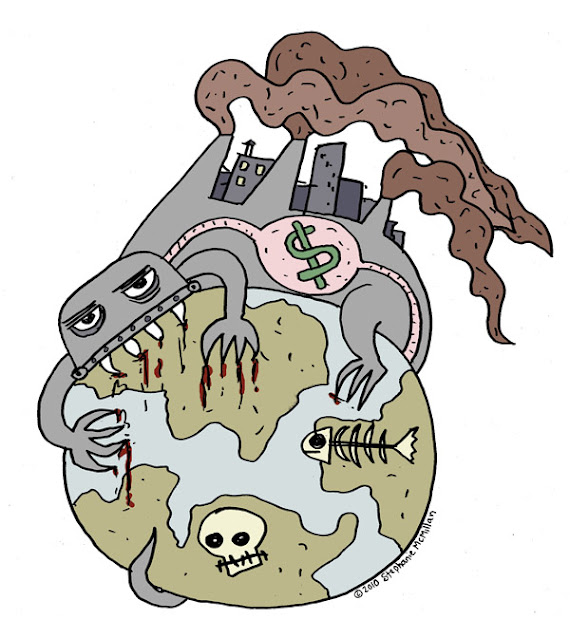 |
Can Capitalism Coexist With the Environment
by Desiree Leigh, Wake Up to Live
|
Industrial
capitalism stimulated economic growth by way of trade and a global mass market
based on mass production. With the rise
of the industrial revolution, slavery and serfdom were uprooted and the lower
social class could now earn wages and own property. Fluidity between classes became
apparent. Thus, capitalism brought
benefits such as freedom of choice, a competitive market, private ownership,
and economic and political independence.
Nonetheless, can a capitalist system coexist with the environment? Capitalism brought “domination and
exploitation” (Parkinson & Drislane, 2011, p.163) over the working class,
conglomerate control of industry, and destruction to the ecological system. The major concerns of a capitalist system in
relationship with the environment is the attitude of maximizing corporate
capital at all costs, even at the expense of abolishing the environment by way
of industrial pollution, such as toxic chemicals, sacrificing public health,
and the free trade agreement.
With
the growth and expansion of technology and production by way of a capitalist
system, an abundance of toxic waste products began to accumulate from various
corporate industries; and, in order to maintain a profit, the industrial
corporations needed to dispose the toxic materials with minimal expenses. Oil, gas, uranium ore mining, and steelmaking
industries created massive levels of toxic chemical wastes. Thus, toxic dump sites were established in
many rural Northern communities across Canada, as well as other areas, with
negligence to the occupants, lake water, soil absorption, and air quality. For example, the Inuit communities of the
Northwest Territories were “exposed to excessive radiation from uranium ore”
from the nearly “two million tons of radioactive [material] dumped into the
Great Bear Lake” without the federal Crown corporation warning individuals
about the dangers of being exposed to the toxic chemicals (Brym, 2008, p.286).
As Barlow and May stated, it was not only careless, it was a criminal act (p.286). Individuals living in toxic waste dump sites
suffered with health problems and many died from tuberculosis and cancer
(p.286). Human lives, animals,
fisheries, and the ecological system were destroyed in doing what was ‘right’
for the corporation: maximizing corporate profits at all costs by minimizing
expenses and allowing the Inuits the suffer from the Crown corporations consequences!
Because
there is great pressure placed on the government by corporate lobbyists to do
what is right for the corporation, and so that the corporation does not suffer
from any financial ramifications, the government submits to the pressure. The lax government authority for the safety
of the environment and human welfare seems to imply that Canada takes a
backseat “treat[ing] toxic chemicals as though they have constitutional rights
– innocent until proven guilty” (p.290).
Even when the government took action to ban a toxic chemical called MMT,
they found themselves in a predicament when a U.S. based corporation lost
profits and held Canada accountable. The
North American Free Trade Agreement (NAFTA) signifies a capitalist system to
its fullest rank that maximizes profits for the sacrifice of human health and
the environment.
“[U]nder
provisions of Chapter II of NAFTA, companies from one of the three NAFTA
countries [Canada, USA, Mexico] who lose profits based on a regulatory decision
in one of the other countries can sue the government for damages” (p.291).
A case in point was
Ethyl Corp, which sued Canada for “damages in the amount of $350 million”
(p.291) when the Canadian government took action to ban MMT. To add, in the court proceedings Ethyl Corp.'s Canadian lawyer Barry Appleton said, "it wouldn't matter if a substance was liquid plutonium destined for a child's breakfast cereal. If the government bans a product and a U.S.-based company loses profits, the company can claim damages under NAFTA" (p.291).
In summary, for a healthy relationship to coexist between
capitalism and the environment, reform must take place to regulate pollution
and implement laws, which neither government nor corporations can overpass,
that protect the environment and mankind.
Awareness of the present danger of toxic chemicals needs to be a united
and global issue. Nonetheless, once the
capitalist clutches the taste of wealth, power, exploitation, and control, how
do they slow down the ravenous? Whether it
is the capitalist system itself or the lax in governmental laws in free trade
and pollution regulations, our environmental health is in danger.
Reference
Brym,
R. J. (2008). Industrial Pollution in Canada. Society in Question (5th ed.). (pp. 285-292). Toronto, Ontario: Nelson
Education Limited.
Parkinson
and Drislane. (2011). The Canadian Economy and New Forms of Work. Exploring Society:
Pathways in sociology (2nd
ed.). (pp. 181-189). Toronto, Ontario: Nelson Education Limited.



This is an awesome post.Really very informative and creative contents.
ReplyDeleteIELTS Coaching in Chennai
Best IELTS Coaching in Chennai
French Language Classes in Chennai
pearson vue exam centers in chennai
Informatica MDM Training in Chennai
Hadoop Admin Training in Chennai
IELTS Coaching in Tambaram
IELTS Coaching in Anna Nagar
Spot on with this write-up, tech I honestly feel this site needs much more attention. I’ll probably be returning to see more, thanks for the info!
ReplyDelete